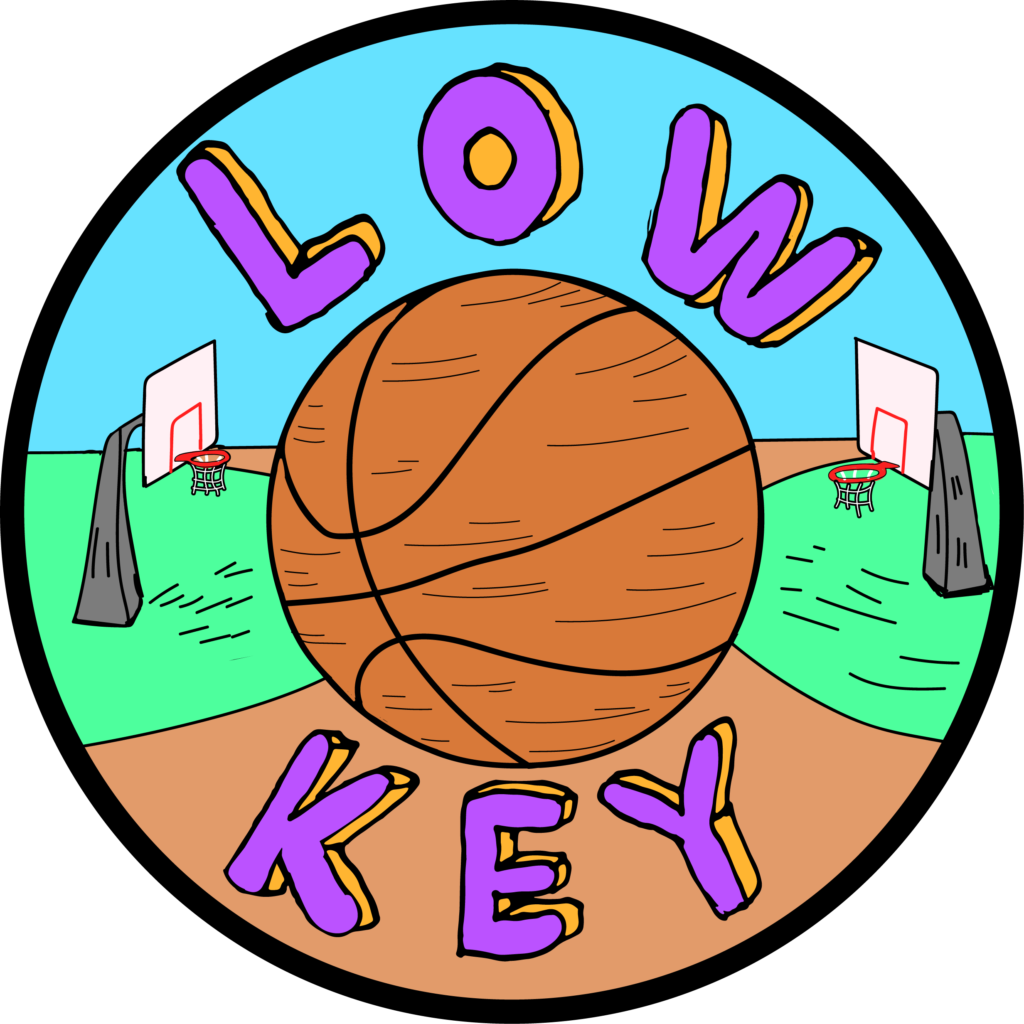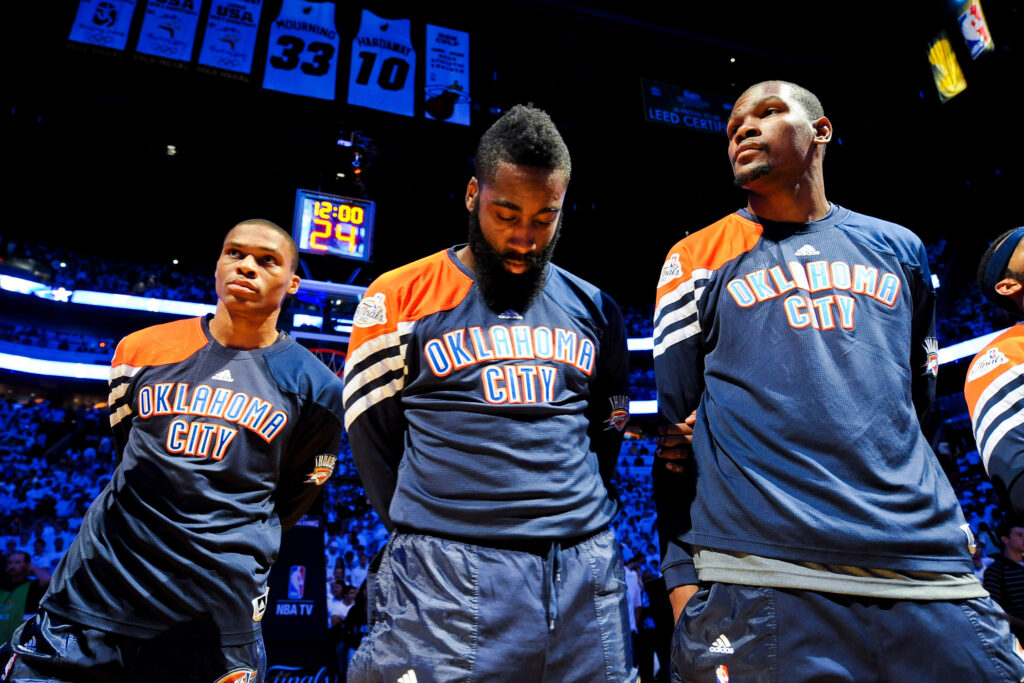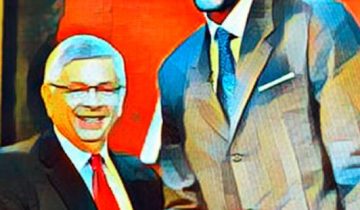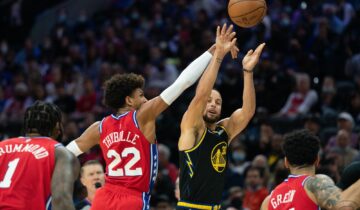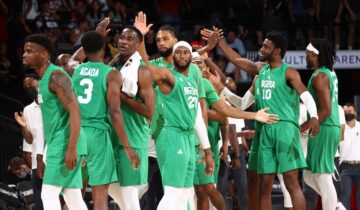Ever since Michael Jordan retired—for the second of three times—in 1999, NBA fans and executives have been entranced by a perpetual search for the next Michael Jordan. He might have been staring them right in the face the entire time.
In debates about the most Jordanesque players of the post-Jordan era, the most commonly invoked names are Kobe Bryant and LeBron James. Bryant played the same shooting guard position as Jordan, won five championships, and was known for his killer instinct in the clutch. Upon retiring after this season, he finished with the third-most points in NBA history—right ahead of Jordan. But the fact that Bryant shared with spotlight with Shaquille O’Neal for his first three titled with the Lakers—or, one could argue, even took a backseat to the big fella—may detract from the feasibility of comparing him to Jordan.
James, one of the most versatile and athletic players in league history, has won four MVP awards—three more than Kobe, one less than Jordan—and three championships. And he isn’t done. He just ended Cleveland’s 52-year pro sports championship drought, in his home state of Ohio, by overcoming the best regular season team in NBA history in an unprecedented comeback from a 3-games-to-1 NBA Finals deficit. But he’s often knocked for losing four times in the Finals, compared with Bryant’s 5-2 mark and Jordan’s sterling 6-0 Finals record.
Naturally, the perpetually under-the-radar Tim Duncan doesn’t enter the usual conversations about the “next Jordan.” He’s a big man, meaning that comparing him to wing players Jordan, Bryant, and James is essentially a comparison of apples and oranges. And his game isn’t quite as exciting to watch. But after Duncan on Monday announced his retirement after 19 NBA seasons, it’s time to give the “Big Fundamental” the recognition he deserves and often doesn’t receive. My colleague Eitan Rosenberg has noted that certain NBA players are so frequently discussed as being underrated that they become overrated, and then they’re so often touted as overrated that they become…underrated again. Well, I simply can’t remember a time during my two decades of NBA fanhood that Tim Duncan was “overrated.” No, he probably wasn’t the next Jordan. But he was arguably the most accomplished player of the post-Jordan era—yes, even more accomplished than Kobe and the unfinished career of LeBron.
In 19 seasons, Duncan averaged 19 points, 10.8 rebounds, 3 assists, and 2.2 blocks per game. The numbers are deflated by the 40-year-old’s statistical dip in recent years, including 8.6 points per game in his final season. He won five championships—including as San Antonio’s best player (with all due respect to fellow Twin Tower David Robinson) in just his second season—and two MVPs. During the same period, fellow superstar big men Kevin Garnett and Dirk Nowitzki won just one championship apiece; by that measure, Duncan sets himself apart from Garnett and Nowitzki in the big man category more than Jordan outpaces Bryant and James in the pantheon of wing players.
The Spurs have 50 games or more for 17 consecutive seasons. What has enabled their remarkable run of sustained dominance? Duncan’s willingness to sacrifice. In his final season, he took a base salary of $5.3 million, while a declining Bryant was paid a league-high $25 million. San Antonio’s season ended in a disappointing second-round playoff loss, but the team won a franchise-record 67 games in the regular season after it was able to sign Duncan’s de facto replacement, LaMarcus Aldridge, in free agency—all because Duncan’s sacrifice gave them the salary cap flexibility to do so.
Kobe’s Lakers, meanwhile, hampered by their aging superstar’s massive contract, continued their descent with a 17-65 record this past season—the second-worst mark in the NBA. Unlike Kobe, who announced his impending retirement in the middle of the season, Duncan had no high-profile “farewell tour” and didn’t announce his retirement until now—precisely because his team, unlike Kobe’s, was a championship contender until the very end of his career. That’s typical Duncan for you. Fair or not, I’ll remember not only the high point of Kobe’s career, but also the sour taste of the end. Duncan didn’t ride off with the storybook ending of a championship, but his financial sacrifice ensured his team’s success for years to come, while there’s no telling how long the Lakers will take to rebuild.
With LeBron’s career still ongoing, the debate over the post-Jordan era’s top player comes down to Kobe and Duncan. The argument for both stars has merit, but what it comes down to for me is their relative contributions to their teams’ success. When the Spurs won their last title in 2014, the team’s best regular season player was arguably Tony Parker, while Kawhi Leonard won Finals MVP. But Duncan was indisputably the Spurs’ top player for their four other championships. Kobe was the undisputed alpha dog on only two of his five Lakers’ championship teams. Duncan got the last six years of David Robinson’s career as well as solid supporting stars in Parker and Manu Ginobili, but he didn’t get to play with another superstar in his prime, as Kobe did with Shaq. Their records in the Finals—5-2 for Kobe, 5-1 for Duncan—are essentially a wash. (Though the only thing standing between Duncan and a Jordanesque 6-0 Finals mark is Ray Allen’s miracle 3-pointer in Game 6 of the 2013 Finals.) The Lakers had a three-peat, but also had their fair share of ups and downs during the Kobe era. Duncan’s Spurs never repeated as champs, yet the only sure things in life during his 19 NBA years were death, taxes, and 50 wins for San Antonio.
When I’m building an all-time starting five—based not only on player legacies, but also positional fits—I’m seriously considering Duncan for my power forward spot. Kobe, however, isn’t in consideration for the shooting guard spot already occupied by Jordan. It’s a close call, but I’m choosing Duncan as the top player of the post-Jordan era—just for now, because the final product of LeBron’s career may eclipse him.
But maybe we shouldn’t even be talking about Jordan, or finding the next Jordan. Maybe we should be asking: Who will be the next Tim Duncan?
